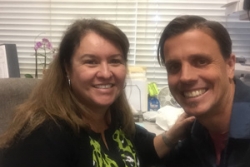
“The good life is a process, not a state of being. It is a direction, not a destination.”
– Carl Rogers
This week, I had one particularly fantastic day with my students. The lunch groups flowed along, the individual sessions were productive, and I felt great at the end of the day. Afterwards I was reflecting on what had made this day so successful. As I thought about the day, I realized that it was not about what had happened on the outside that made the day feel so satisfying. The real satisfaction came from the genuine enthusiasm and interest that I had brought to each of my endeavors. This included administrative tasks that I have avoided in the past.
When I started out as a teacher I was more reactionary. My own experience was easily influenced by the mood, attitude, and behavior of the people I was working with, and the students I was teaching. Though I tried to be a pillar of focus and strength, more often than not, I was unable to sustain it. I did not yet realize how much of my own sense of self and well-being was dictated by the approval, or disapproval of others. This has been a big part of my learning over the past 17 years that I have worked as an educator.
On the day that I mentioned at the top of this article, I was not seeking the approval of others. In fact, I was more concerned with giving my approval, as well any direction I could offer, to my students. I enjoyed watching them make their choices because I was not afraid that it was somehow a reflection of my ability as a teacher, or my value as a person. From that neutral place, it was easier for me to influence my students. I did not need them to hear me, and so they were more open to listening. I was able to let them express themselves more fully, while at the same time feeling confident that I could grab their attention when I needed it.
During a session that I had with an individual student, I noticed that he was doing everything he could to avoid engaging with the work he had been assigned. Rather than allowing those behaviors to frustrate me, I kept the session moving in a positive and productive direction. When he reached into his bag for some food, for example, I complimented him for being wise enough to eat when he is hungry, and then noted that he had made excellent food choices. I joked with him about how hungry I was while at the same time prompting him to complete the assignment that was on the table in front of him. In the psychology world this is referred to as avoiding a power struggle, while redirecting and rewarding any and all movement in the direction of the desired behavior. In the end, it worked. We got through some science and math work, and he was on his way.
During my lunch groups, I allowed my students more room to roam. With my young group, for example, I typically encourage them to stay seated for a majority of our sessions. In the past, the students getting up triggered my fear of being seen as a weak teacher who had no control over his students. This time I was not concerned with what anyone else was thinking. I was more interested in getting all of these wonderful students engaged in a fun activity that would encourage turn taking, active listening, and friendship building. When our game of charades started moving around the room, I went with it. My only focus was directing the students to engage in friendly, and attentive ways, with one another. I was able to see that it was appropriate for children at that age to move about and act completely silly. By honoring that fact, I was able to accomplish my desired results and enjoy the process.
I encourage you to reflect on your own life. Think about any recent situations that have been particularly challenging, or particularly successful. How does it feel when you are in the flow, aware of what you came to accomplish, and fully engaged in what you are doing? If you have a situation that has been challenging you, take some time to imagine how you would like it to go. Think about what your primary goal is, and see if you can let go of any limiting beliefs or approval seeking behaviors that have been getting in the way of you having the optimal experience in that area. When you value yourself, and your vision, and trust yourself in the process, positive results will surely follow.
Edward Biagiotti is the Inclusion Specialist for Culver City Unified School District. He is also co-host of the popular radio show, Funniest Thing! with Darrell and Ed, live each week, Wednesdays at 3 pm on www.UnityOnlineRadio.org. Visit www. TappingIntoGenius.com for more articles and a free, inspirational parenting download.
